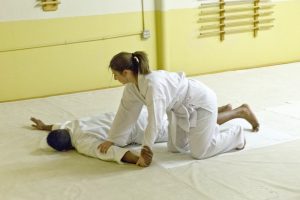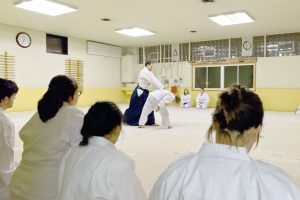
This semester students are engaging religion in a new way thanks to a new course taught by Dr. Michelle Lelwica.
Lelwica’s course, Religion and the Body, uses nontraditional pedagogy. Lelwica believes that having an emphasis on experiential learning will help students to view class readings and their own experiences in a different light.
“When you think about what you do in a lab you kind of apply concepts and look under the microscope and you examine things in a hands-on way,” Lelwica said. “In this class, the lab includes learning how to do Aikido, which is a Japanese martial art.”
Students go twice a week to North Wind Aikikai, a dojo located in downtown Fargo. North Wind Aikikai’s website states that, “The techniques learned in Aikido can be lethal and require determination and an enhanced awareness of time, space, balance and force.”
The Aikido lab is a departure from traditional classroom and lab settings as there is very little verbal instruction involved and students are expected to learn through watching and doing.
“It’s not a philosophical discussion, it’s not even a verbal instruction of ‘You move your right foot here and you move your left arm here,’” Lelwica said. “You watch what the teacher does and then you try to imitate that through your body.”
Students are also enjoying the change of pace that the new course has to offer. Senior Gus McCarthy said that it is a good reminder of the importance of the physical body in relation to your mental state.
“I find it very refreshing, I think a lot of classes get caught up in the lecture and academic work that you forget that your body is also a dominating force in your life,” McCarthy said. “There’s this driving force of really focusing on the mental aspects of your life, whereas this really kind of brings you back to the physical.”
The Aikido lab isn’t the only experiential learning aspect that the class uses. Lelwica says that they also practice Zen meditation for about fifteen minutes at the beginning of each class and use that as a new lens to view the rest of the course through.

“We’re using the meditation practice to study the ideas and we’re looking at the ideas through the experience of the practice of meditation,” Lelwica said.
The practice of the meditation is the most important part to some students like McCarthy who appreciate the practice more than just the discussion about such a topic.
“We’ve talked about meditation very heavily, and meditation was something that I wanted to do more actively in previous years but never really got around to it, so now that we are actively mediating two times aweekthenIdoitonmyownalittle bit,” McCarthy said. “Learning by doing is a lot better than learning by talking about it.”
Some of the discussion topics being explored in the class include Buddhism, Christianity, Shamanism, Taoism, Sufi Islam, Taoism, and ideas from Descartes. But, since the class is heavy in experiential learning, Lelwica has taken a new stance on ideas like memorization and how to learn.
“It’s not a class about memorization, it’s a class of learning how to connect ideas with their experience – learning how to think critically through their experience but also learning how to learn from a place of not knowing,” Lelwica said.
Lelwica hopes that exploration the class undertakes is beneficial to her students, though she knows it will affect everyone differently.
“I don’t know what the outcome will be, it’s going to be different for 25 different students, it’s not a one-size-fits-all outcome, but I hope that reflecting on one’s relationship with one’s body is beneficial and that my real hope would be that their relationship becomes peaceful,” Lelwica said. “If it’s not peaceful, more healthy if it’s not healthy.”

